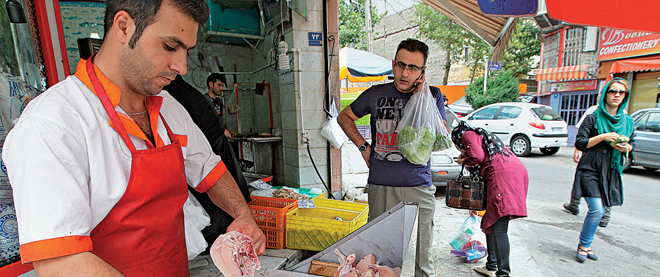Tehran’s very fowl summer
A countrywide chicken shortage sparks protests in Iran as sanctions begin to bite.
Atta Kenare/AFP/Getty Images
Share

The list of things Iranian media are forbidden or discouraged from depicting is long, but usually at least has the virtue of being predictable: gay sex, any other kind of sex, unveiled women, drinking parties.
This summer, television stations were warned of a new taboo: eating chicken. Tehran’s police chief Esmail Ahmadi Moghaddam urged networks not to show anyone consuming chicken, lest the images inflame class tensions and lead to violence. “Certain people witnessing this class gap between the rich and the poor might grab a knife and think they will get their fair share from the wealthy,” he said.
Ahmadi Moghaddam’s warning comes amid a countrywide chicken shortage, with prices for remaining birds soaring beyond the reach of many consumers. The crisis has been blamed on a combination of economic mismanagement and international sanctions, which make it difficult to do even legitimate business with Iran. At least one ship full of chicken feed reportedly left Iran earlier this year without unloading its cargo because it couldn’t get paid.
“Shipping companies don’t want to deal with Iran, and banks don’t want to deal with Iran,” says Patrick Clawson, director of research at the Washington Institute for Near East Policy. Because Iran uses its banks to disguise transactions that might violate laws regarding money laundering and financing terrorism, other financial institutions are leery about doing business with them, he says. “Iran is increasingly being isolated from the international financial system.”
The rising price of chicken has dominated public debate in Iran this summer, which coincides with Ramadan, when families like to break their fast with a large evening meal. A protest recently erupted outside a poultry store in the northeastern city of Nishapur. And countless barbs and jokes are making the rounds. Some, mocking the warning to television stations, liken roast chicken to pornography—something that must be kept hidden from innocent eyes. Others take aim at Qom cleric Makarem Shirazi, who used a sermon to berate those complaining of its cost: “So what if people don’t eat chicken?” he asked. “All doctors agree that eating meat products is bad for your health.”
Much of the anger is directed at the Iranian government, rather than the sanctions. “There seems to be this clear understanding that this crisis was a slow-moving one and could have been averted or at least mitigated had there been greater attentiveness on the part of the government,” says Suzanne Maloney, a senior fellow at the Brookings Institution’s Saban Center for Middle East Policy.
The exact role sanctions have played in Iran’s chicken shortage is disputed. Potkin Azarmehr, an Iranian blogger based in London, puts the blame squarely on the Iranian government and cites a statement by Iranian member of Parliament Ali Aliloo, who said most of Iran’s financial woes were due to the “economic mafia” strangling the country.
Saeed Rahnema, a political science professor at York University, says sanctions have been “devastating” for the Iranian people but argues they have little effect on the country’s political and religious rulers. “The people associated with the regime, who are really wealthy, they couldn’t care less. Ayatollahs will have chickens delivered to their houses,” he says. It’s ordinary Iranians being hurt. Sanctions need to take aim at “the big shots,” he says, “the big thieves in the Revolutionary Guards, the mullahs.”
These sanctions, though designed to force Tehran to change its nuclear stance—not punish the entire country—are overused because they are politically popular in Washington, says Maloney. They become “permanent instruments” instead of tools to incentivize Iran to make specific concessions.
And yet they are popular for a reason. America doesn’t have a lot of other options to deploy against Iran’s nuclear program that don’t involve air strikes. Along with Israel, it continues to use cybertactics—and Iran’s nuclear scientists run an abnormally high risk of getting blown up on their way to work. These methods might temporarily thwart Iran’s nuclear ambitions, but they’re unlikely to end them.
Sanctions, the theory goes, might force Iran to strike a more enduring diplomatic bargain. Iran did agree earlier this year to resume negotiations with the P5+1, the five permanent members of the UN Security Council, plus Germany. “It’s very hard to come up with an explanation of why Iran has returned to the negotiating table, unless you say they were feeling pain from the sanctions,” says Clawson.
But a willingness to negotiate doesn’t mean Iran genuinely wants a deal the West will accept. Previous negotiations have been unsuccessful. Believing these talks will end differently requires substantial optimism, or a short memory.